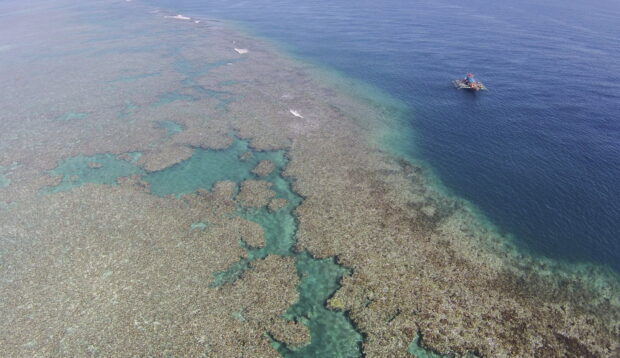PH to build case on Chinese fishers’ alleged cyanide use in WPS

TRADITIONAL FISHING GROUND This 2016 photo taken by a drone camera shows part of Scarborough Shoal, also known as Panatag and Bajo de Masinloc, which is a traditional fishing ground of Filipino fishermen in the West Philippine Sea that is being claimed by China. —REM ZAMORA
The National Task Force on the West Philippine Sea (NTF-WPS) has directed the Bureau of Fisheries and Aquatic Resources (BFAR) to gather more evidence on the alleged use of cyanide by Chinese fishermen in Bajo de Masinloc (Scarborough Shoal).
“We have instructed BFAR to complete the documentation that [they] have taken, the pieces of evidence and affidavits they have so far obtained, [and] we will investigate this report,” Assistant Director General Jonathan Malaya of the National Security Council (NSC) said during the Bagong Pilipinas Ngayon television briefing on Monday.
The NTF-WPS was established by Memorandum Circular No. 94 issued by the Office of the President on March 17, 2016. According to that order, the NSC shall provide “administrative and technical support” to the task force.
Malaya said the findings, if validated, could be forwarded to the Department of Justice and the Office of the Solicitor General for building a case on environmental destruction before an appropriate international tribunal.
He emphasized that “we have to be careful” in verifying BFAR’s claim of cyanide use by Chinese fishermen.
BFAR spokesperson Nazario Briguera said in a news forum on Feb. 17 that “These Chinese fishermen use cyanide. They intentionally destroy Bajo de Masinloc to prevent Filipino fishing boats from fishing in the area.”
“[The question is], do we have the solid evidence to prove our allegations so that we will not face difficulty to prove to the court?” Malaya said, as he noted that BFAR’s assertion was based on what Filipino fishermen had told the agency.
Fernando Hicap, national chair of fisherfolk group Pamalakaya, had also claimed that “Filipino fishermen have long known and reported China’s use of sodium cyanide [so they could get a good] catch like octopus, lapu-lapu (grouper), lobster and others—in addition to its purpose of deliberately destroying the reef so that fish and Filipino fishermen will never return.”
‘Long overdue’
Malaya said BFAR had been directed “to collect all of those testimonies.”
He also called on Filipino fishermen to maintain their activities in Bajo de Masinloc, a shoal off Zambales province.
“Keep on fishing in that area [because] that is part of our territory and the government is going to support you,” he said.
Malaya also cited a recent resupply mission which brought 14,000 liters of diesel fuel, 60 liters of motor oil, food packs and other essentials to 21 Filipino fishing boats there.
The fishermen said the government’s support was “long overdue.”
“So much has happened, why only now?” asked Leonardo Cuaresma, president of the New Masinloc Fishermen Association, based in the town of the same name in the coastal province of Zambales.
It was only recently that the government had ordered the Philippine Coast Guard (PCG) and BFAR to hold “rotational patrols” at Bajo de Masinloc.
Fisherman Jeffrey Elad, 43, said, “I hope it will come true and it won’t just be words, because when we went there this month, there was no Philippine Coast Guard, only the Chinese coast guard.”
“But we are thankful because if they (PCG) guard the area, we will be free to fish there instead of just stay outside [that area],” he added.
‘Filipino, out’
Cuaresma and other Masinloc fishermen interviewed by the Inquirer said they had encountered Chinese vessels not only at Bajo de Masinloc but even about 50 kilometers from the municipal waters.
“They are really close, so even those who don’t make it to Scarborough are scared when they see the Chinese ships,” Cuaresma said.
Ronnie Drio, 55, said Chinese aggression in the West Philippine Sea (WPS) had intensified.
“In the past, they would just shoo you away. They would say, ‘Filipino, out.’ But now they will block or chase you until you leave,” he said.
READ: NSC to probe foreign fishermen’s alleged use of cyanide in Scarborough
“They’re too close. It’s like they own the whole Philippines. People from nearby Cato village in Infanta, Pangasinan, also noticed that,” Drio added.
Bobby Roldan, Luzon vice chair of Pamalakaya, said, “If only the government had been prompt in patrolling our territorial waters, cases of harassment against Filipino fisherfolk could have been prevented.”
“With or without government authorities, Filipino fishermen will assert national sovereignty and fishing rights against any foreign aggressors,” he added. INQ
For comprehensive coverage, in-depth analysis, visit our special page for West Philippine Sea updates. Stay informed with articles, videos, and expert opinions.